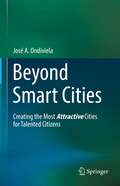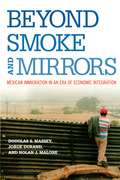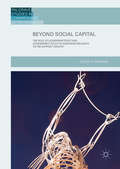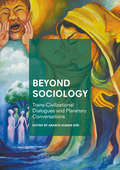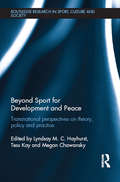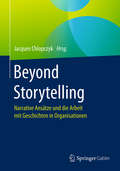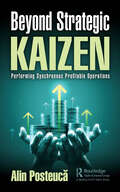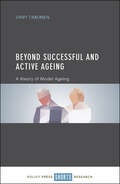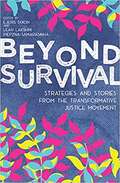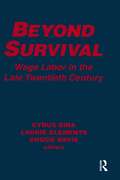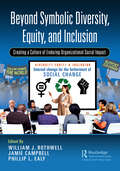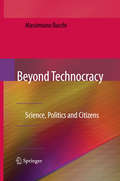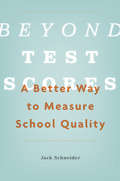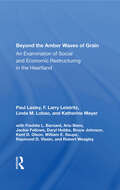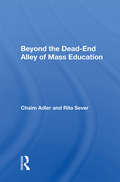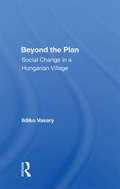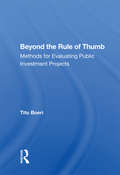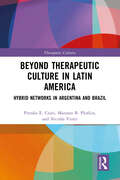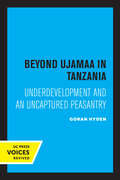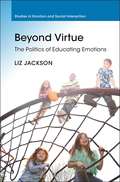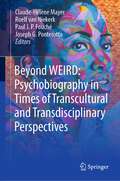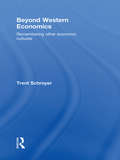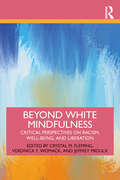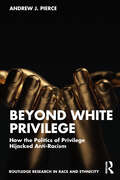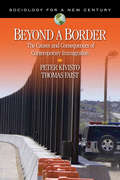- Table View
- List View
Beyond Smart Cities: Creating the Most Attractive Cities for Talented Citizens
by José A. OndivielaCities are experiencing unprecedented times. In addition of managing the best possible post-pandemic recovery, Cities are at the beginning of the 4th industrial revolution, and all want to play a relevant role in it. To achieve this, they must retain and attract the necessary talent. There is a fierce competition where cities transform to become as attractive as possible. But what makes a city attractive (from emotional and rational sides) to talented citizens? For mayors and city directors: how can I prepare my city for this goal? What kind of transformations in the medium-long term should I develop? And in the short term, what processes and technologies (SmartCity) should I put in place? And from the point of view of citizens: how do I choose the best city to develop my full potential? Which one offers me the best citizenship contract? Where am I going to enjoy the best services with the highest quality of life and lower taxes/cost of life? In addition, the city must be attractive, with a strong identity and dynamism and promising future. Can I find the cities that best suit my aesthetic and emotional preferences, and that also offer me the services that I consider a priority at the lowest cost to my pocket? Find all the answers in this book.
Beyond Smoke and Mirrors: Mexican Immigration in an Era of Economic Integration
by Douglas S. Massey Jorge Durand Nolan J. MaloneMigration between Mexico and the United States is part of a historical process of increasing North American integration. This process acquired new momentum with the passage of the North American Free Trade Agreement in 1994, which lowered barriers to the movement of goods, capital, services, and information. But rather than include labor in this new regime, the United States continues to resist the integration of the labor markets of the two countries. Instead of easing restrictions on Mexican labor, the United States has militarized its border and adopted restrictive new policies of immigrant disenfranchisement. Beyond Smoke and Mirrors examines the devastating impact of these immigration policies on the social and economic fabric of the Mexico and the United States, and calls for a sweeping reform of the current system. Beyond Smoke and Mirrors shows how U.S. immigration policies enacted between 1986–1996—largely for symbolic domestic political purposes—harm the interests of Mexico, the United States, and the people who migrate between them. The costs have been high. The book documents how the massive expansion of border enforcement has wasted billions of dollars and hundreds of lives, yet has not deterred increasing numbers of undocumented immigrants from heading north. The authors also show how the new policies unleashed a host of unintended consequences: a shift away from seasonal, circular migration toward permanent settlement; the creation of a black market for Mexican labor; the transformation of Mexican immigration from a regional phenomenon into a broad social movement touching every region of the country; and even the lowering of wages for legal U.S. residents. What had been a relatively open and benign labor process before 1986 was transformed into an exploitative underground system of labor coercion, one that lowered wages and working conditions of undocumented migrants, legal immigrants, and American citizens alike. Beyond Smoke and Mirrors offers specific proposals for repairing the damage. Rather than denying the reality of labor migration, the authors recommend regularizing it and working to manage it so as to promote economic development in Mexico, minimize costs and disruptions for the United States, and maximize benefits for all concerned. This book provides an essential "user's manual" for readers seeking a historical, theoretical, and substantive understanding of how U.S. policy on Mexican immigration evolved to its current dysfunctional state, as well as how it might be fixed.
Beyond Social Capital: The Role of Leadership, Trust and Government Policy in Northern Ireland's Victim Support Groups (Palgrave Studies in Compromise after Conflict)
by Laura K. GrahamDrawing on lessons from civil society in Northern Ireland, Beyond Social Capital examines the limitations of social capital theory in deeply divided societies. It draws on an ethnographic study of victim support groups and evidence drawn from policymakers in Northern Ireland to reconceptualize the traditional bonding-bridging distinction. The role of leadership is particularly examined, as the book highlights the complex and compelling ways in which leadership supports and shapes the activities, practices and motivations of the victim self-help industry in Northern Ireland. The multiple dimensions of this industry are explored, including: social and victim policy; private, statutory, and voluntary sector collaboration; the political motivations of victim support groups, and; the types of social capital being built in victim groups and the impact that this social capital has on victims and wider elements of the peace process. Importantly, Laura K. Graham challenges the prevailing notion that all forms of social capital are inherently good for civic organizations and associational life. Instead, a new form of social capital existing in divided and post-conflict societies is advanced. This form of social capital, called 'dysfunctional bonding', may have negative impacts, causing distrust within and outside a group and can be particularly problematic for those traumatized by political conflict. With international relevance, this book will be of great interest to those working in post-conflict studies as well as victim studies.
Beyond Sociology: Trans-Civilizational Dialogues and Planetary Conversations
by Ananta Kumar GiriSociology and Beyond: Windows and Horizons is an excellent, lively, and comprehensive odyssey, bringing new life to sociology by going beyond conventional paradigms and disciplinary boundaries. The book is a bold and pioneering endeavor in its quest for a new vision and practice of the idea of society. Offering the concept of society as ontological sociality and as a space of meditative verbs of co-realizations - self as well as collective - the book continues the border-crossing, transgressive, and transformative quest of those seeking knowledge and practice. It pleads for going beyond parochialism - both metropolitan and native, Western and Indian - and realizes sociology as part of multi-dimensional planetary conversations involving both comparative global studies as well as cross-cultural conversations. Thoughtfully argued and lucidly written, Sociology and Beyond: Windows and Horizons pleads for the sadhana of a transdisciplinary, transparadigmatic, and transformative sociology, animated by the passion of self-development, inclusion of the other, and planetary realizations.
Beyond Sport for Development and Peace: Transnational Perspectives on Theory, Policy and Practice (Routledge Research in Sport, Culture and Society)
by Tess Kay Lyndsay M. Hayhurst Megan ChawanskyDebates around the ‘sport for development and peace’ (SDP) movement have entered a new phase, moving on from simple questions surrounding the utility of sport as a tool of international development. Beyond Sport for Development and Peace argues that critical research and new perspectives and methodologies are necessary to balance the local aspects and global influences of sport and to better understand the power relations embedded in SDP on a transnational scale. As the era of the Millennium Development Goals gives way to a new agenda for sustainable development, this book considers the position of SDP. The book brings together contributors from 15 different countries across the developed and developing worlds, including academic researchers and ‘on the ground’ experts, practitioners and policy-makers, to provide one of the most diverse set of perspectives assembled in SDP scholarship. Looking to the renewed development agenda, its authors explore theoretical, policy and practical dimensions that address the broadening geographical and cultural spread of SDP, the emergence of issues such as child protection within it, its increased capacity for critical reflection on practice, and its potential for new collaborative approaches to knowledge production. Through its combination of academically-led chapters paired with practice-oriented ‘responses’ it offers an important reconceptualization of SDP as a contributor to development policy, and opens up important new avenues for studying and ‘practising’ SDP. Beyond Sport for Development and Peace is therefore essential reading for all researchers, advanced students, policy-makers and practitioners working in sport development or international development.
Beyond Storytelling: Narrative Ansätze und die Arbeit mit Geschichten in Organisationen
by Jacques ChlopczykBeyond Storytelling stellt unterschiedliche Ans#65533;tze, Methoden, Werkzeuge und konkrete Beispiele f#65533;r die Arbeit mit Geschichten in Organisationen vor. Dabei hat das Buch zum Ziel, sowohl grundlegende Aspekte und Konzepte narrativer Ans#65533;tze in Organisationen zu beleuchten, als auch anhand von konkreten Praxisbeispielen das Potential dieser Ans#65533;tze f#65533;r Marketing, Kommunikation, Organisationsentwicklung, Coaching, Wissensmanagement und Lernen in Organisationen aufzuzeigen. Dieses Buch ist eine Einladung dazu, die Arbeit mit Geschichten weiter zu fassen als das Erz#65533;hlen attraktiver ,,Stories". Im Buch wird in den verschiedenen Beitr#65533;gen ein transdisziplin#65533;rer Ansatz entwickelt, der Geschichten als grundlegendes Prinzip menschlichen Denkens, F#65533;hlens und Handeln begreift. Die vorgestellten narrativen Methoden und Ans#65533;tze erm#65533;glichen es f#65533;r Organisationen neue Denk- und Handlungsr#65533;ume zu erschlie#65533;en. Das Buch ist dabei nicht als Endpunkt einer Geschichte gedacht, sondern als Auftakt fur eine intensive Auseinandersetzung mit dem Potential dieses Ansatzes f#65533;r Organisationen und Unternehmen.
Beyond Strategic Kaizen: Performing Synchronous Profitable Operations
by Alin PosteucăCurrently, the challenge for manufacturing organizations is how to achieve their expected profit by continuously improving productivity or reducing costs. Manufacturing organizations have been using different improvement approaches to achieving cost reduction and productivity improvement for years by eliminating various losses and waste structures, such as excess inventory, excessive workforce, excessive capacity, excessive utility consumption, and so on. But is the problem solved? Unfortunately, no! Often manufacturing companies focus on maximizing the flow and meeting customer needs but forget their real aim – to make a profit for their stakeholders. Too many organizations meet customer expectations by seeking to continuously synchronize the flow to market demand but forget to check that they are doing it profitably enough to ensure business continuity and prosperity. When the financial results show that they are not so profitable, it is already too late. Moreover, the strategic direction of systematic improvements according to the sales trend – depending on the current degree of production capacity utilization and its dynamic effects on cost structures – is deficient in many manufacturing companies. So, would the failure of strategic and profitable systematic improvements be an option? Of course not! If the ultimate goal of the organization is to create target profit for stakeholders, then the behavior and strategic systematic improvements must be directed to those scenarios, strategies, tasks, problems, and “production levers” that are best based on creating the target profit. That’s what Strategic Kaizen thinking does – the simultaneous and consistent achievement of systematic operational and financial improvements in a strategic and operational manner. It achieves both synchronous operations at market demand by fulfilling takt time and profitable operations in accordance with profit demand by fulfilling takt profit. In short, the Strategic Kaizen mission is striving for the fulfillment of the ideal state of operations called synchronous profitable operations. In this book, the author, while presenting in detail the seven processes of Strategic Kaizen methodology, exposes the answer to historically incomplete thinking of productivity improvements for target profitability. The uniqueness of the book is reinforced by the detailed presentation of the successful application of the Strategic Kaizen thinking over the years in two multinational manufacturing organizations operating in highly competitive markets, addressing the synchronous profitable operations for both the sales increase scenario and the sales decrease scenario. Moreover, it presents examples of the practical application of the “white-collar” Strategic Kaizen. Essentially, by adopting the Strategic Kaizen methodology presented in detail in this book to consistently achieve the ideal state of a manufacturing organization, organizations will enter a new paradigm of thinking of strategic improvements – Strategic Kaizen thinking – to meet annual and multiannual target profits in a unique and effective way that operates according to its own strategic and operational management system.
Beyond Successful and Active Ageing: A Theory of Model Ageing
by Virpi TimonenThis controversial book argues that concepts such as ‘successful’ and ‘active’ ageing - ubiquitous terms in research, marketing and policy making concerned with older adults – are potentially dangerous paradigms that reflect and exacerbate inequalities in older populations. This author presents a new theory to make sense of the popularity of these ‘successful’ and ‘active’ ageing concepts. Readers are invited to view them through the prism of Model Ageing – a theory that throws light on the causes and consequences of attempts to model ageing as a phenomenon and stage of life that is in need of direction, reshaping and control. This is essential reading for anyone seeking to make sense of social constructions of ageing in contemporary societies.
Beyond Survival: Strategies And Stories From The Transformative Justice Movement
by Leah Lakshmi Piepzna-Samarasinha Ejeris DixonTransformative justice seeks to solve the problem of violence at the grassroots level, without relying on punishment, incarceration, or policing. Community-based approaches to preventing crime and repairing its damage have existed for centuries. However, in the punative atmosphere of contemporary criminal justice systems, they are often marginalized and operate under the radar. Beyond Survival puts these strategies front and center as real alternatives to today’s failed models of confinement and “correction.” In this collection, a diverse group of authors focuses on concrete and practical forms of redress and accountability, assessing existing practices and marking paths forward. They use a variety of forms—from toolkits to personal essays—to delve deeply into the “how to” of transformative justice, providing alternatives to calling the police, ways to support people having mental health crises, stories of community-based murder investigations, and much more. At the same time, they document the history of this radical movement, creating space for long-time organizers to reflect on victories, struggles, mistakes, and transformations.
Beyond Survival: Wage Labour and Capital in the Late Twentieth Century (Labor And Human Resources Ser.)
by Cyrus Bina Chuck Davis Laurie M. ClementsThis text uses an innovative approach to the dynamics of labour's decline and proposes policy initiatives necessary for its revitalization. The book emphasises the need for restructuring of capitalism on a global scale and challenges traditional economic and industrial relations wisdom.
Beyond Symbolic Diversity, Equity, and Inclusion: Creating a Culture of Enduring Organizational Social Impact
by William J. Rothwell Phillip L. Ealy Jamie CampbellThis book extends strategic diversity work beyond internal organization efforts toward social engagement and accountability and supports organizations to ground social impact across both business and employee interests, the first of which is ethics, covered in the initial chapter. Organizations around the world are committed to increasing the racial diversity of their employees. Simultaneously, there is also greater interest in creating more welcoming and psychologically safe environments for people of color within organizations.As the workforce demographics shift because of these initiatives, the interests and needs of the employee population have also shifted. This shift presents a challenge for organizations to move beyond symbolic diversity, equity, and inclusion (DE&I) work, of which increasing racial representation is chief, to helping organizations understand how to determine which issues to support of concern, value, and importance to their employees and society.Essentially, this book, a venture into the field called transorganization development, also moves beyond the traditional view of corporate social responsibility to take the position that businesses have a responsibility to make the world a better place by taking proactive stances on the many challenges facing the world today, including DE&I and accessibility. Many employees today expect their employers to take positions that will lead to making the world a better place.
Beyond Technocracy: Science, Politics and Citizens
by Adrian Belton Massimiano Bucchi"Will the ordinary man become a scientist?...Bucchi exposes the inadequacy of the 'technochratic model' but also the weaknesses of contemporary bioethics when facing the increasing dilemmas posed by science and technology to contemporary society." -Il Corriere della Sera [Italian leading newspaper] "Bucchi provides a clear, rigorous and accessible discussion - often enriched by a subtle irony - of complex and ambiguous issues, showing that science and innovation are not neutral terrains, but rather among the key conflictual contexts in which contemporary social and political changes take place." -Italian Review of Sociology "A dense but accessible book...Bucchi acutely describes the shortcomings of the technocratic and ethical responses to the contemporary dilemmas of science and technology." -Italian Edition of the New York Review of Books Nuclear energy, stem cell technology, GMOs: the more science advances, the more society seems to resist. But are we really watching a death struggle between opposing forces, as so many would have it? Can today's complex technical policy decisions coincide with the needs of a participatory democracy? Are the two sides even equipped to talk to each other? Beyond Technocracy: Science, Politics and Citizens answers these questions with clarity and vision. Drawing upon a broad range of data and events from the United States and Europe, and noting the blurring of the expert/lay divide in the knowledge base, the book argues that these conflicts should not be dismissed as episodic, or the outbursts of irrationality and ignorance, but recognized as a critical opportunity to discuss the future in which we want to live. Massimiano Bucchi's analysis covers the complex realities of post-academic science as he: Explores the widely debated theme of science and democracy across a broad range of technological controversies. Overviews issues raised by the current relationship among scientists, policymakers, business interests, and the public. Dispels stereotypes of the detached scientific community versus the uninformed general public. Examines the role of the media in framing scientific debate. Addresses the question of how to move beyond technocracy to a more fruitful collaboration between scientists and citizens. Offers a bold vision for a future in which the scientific and public spheres regard each other as partners working toward a shared purpose. Beyond Technocracy: Science, Politics and Citizens has great value as a postgraduate text for courses in technology and society, political science, and science policy. It will also find an interested audience among scientists, policymakers, managers in the technological sector, and concerned lay readers. "In his brilliant new book, Beyond Technocracy: Science, Politics and Citizens, Massimiano Bucchi opens for the reader the Pandora's box of the complex relationship between scientists and citizens in contemporary, democratic societies. With major corporations owning university labs and academic researchers (and their institutions) pocketing millions (literally) from the proceedings of patents resulting from their scientific work, Bucchi analyzes the implications of contrasting drives toward for-profit and open science, private and public science. Without pulling his punches, and without hiding behind easy, popular solutions, Bucchi clearly lays out the choices we face when confronted with a science whose potential societal impact - positive and negative - is becoming ever greater (e.g., nuclear energy, genetically modified foods, genetic engineering). Based on a wealth of empirical evidence and case studies, the book is extremely accessible and well written, making it an ideal introduction to the issues. I would highly recommend it to specialists and non-specialists alike!" -Roberto Franzosi, Professor in Department of Sociology at Emory University
Beyond Test Scores: A Better Way to Measure School Quality
by Jack SchneiderTest scores are the go-to metric of policy makers and anxious parents looking to place their children in the best schools. Yet standardized tests are a poor way to measure school performance. Using the diverse urban school district of Somerville MA as a case study, Jack Schneider’s team developed a new framework to assess educational effectiveness.
Beyond The Amber Waves Of Grain: An Examination Of Social And Economic Restructuring In The Heartland
by Paul LasleyThis book explores the large-scale impacts of economic restructuring in the Midwest in response to the 1980s farm crisis. Drawing upon detailed surveys from twelve north-central states, the authors offer a comprehensive view of farm restructuring and its social, economic, and political consequences. The study goes beyond the farm gate to look at the broader implications of those changes for agriculture policy, related industries, and areas still dependent upon farming, contributing to the literature on economic restructuring. Like the factory closings in the Rust Belt, the dramatic failure of agricultural industries in the Farm Belt has caused fundamental changes in the organization and control of production. The impact of job losses and economic depression and the shattering of a way of life have shaken public complacency about the stability of many fundamental American myths. Beyond the Amber Waves of Grain looks at the farm crisis not as a purely agricultural, nonurban issue but as one that adds to our understanding of the overall social impacts of economic change. The book takes up the story of Midwestern farm enterprises in the wake of the farm crisis of the 1980s. Using data drawn from detailed surveys of 3,940 farm households in twelve north-central states, the authors offer a comprehensive view of the social and economic restructuring of agriculture and explore the consequences for farm enterprises, farm households, and farming communities. The study goes beyond the farm gate to look at the broader implications for related industries and communities dependent upon farming, for agricultural and rural policies, and for farm women and men, contributing to the literature on economic restructuring and its outcomes.
Beyond The Dead-end Alley Of Mass Education
by Chaim AdlerThis book deals with the realm of education-getting beyond the dead end of mass education-in the context of Israeli education system. It analyzes the aims and target populations of educational fostering and illustrates the dead-end situation of the educational system.
Beyond The Plan: Social Change In A Hungarian Village
by Ildiko VasaryThis book explores some of the possibilities and limitations inherent in collectivization by examining agricultural changes in one Hungarian village, Pecsely in which the transition from traditional peasant existence to a socialist society and collectivized agriculture could be traced.
Beyond The Rule Of Thumb: Methods For Evaluating Public Investment Projects
by Tito BoeriThis book discusses the rationale for correcting market prices in the evaluation of public investments. It also aims at covering techniques of project appraisals, such as the effects method, cost efficiency techniques, multicriteria analysis, and related logical frameworks.
Beyond Therapeutic Culture in Latin America: Hybrid Networks in Argentina and Brazil (Therapeutic Cultures)
by Piroska Csúri Mariano Ben Plotkin Nicolás ViottiBy focusing on quantitative and qualitative research in Rio de Janeiro and Buenos Aires, this book expands on the notion of "therapeutic culture." Usually considered a global phenomenon disseminated from North to South, and associated to "modern" forms of "psychologized" subjectivity, "therapeutic culture" has become a key notion to understanding contemporary culture. However, this path-breaking research, grounded in a bottom-up perspective that follows specific therapeutic narratives, shows that the concept of the "therapeutic" should be extended to encompass a diversity of practices, both "secular" and "religious," "modern" and "traditional," that are deemed as therapeutic by the actors involved, although they are overlooked as such by most of the current literature. Pentecostal and Afro-Brazilian religions as well as New Age practices coexist and interact with "conventional" therapeutic techniques such as Psychoanalysis, conforming complex and hybrid therapeutic networks associated to different (also hybrid) forms of subjectivity. Although the book draws upon two cases from the "Global South," its theoretical conclusions are applicable to the analysis of the realm of the therapeutic at large. The book is aimed at university students (both graduate and undergraduate) and at the general public interested in the notion of the therapeutic and, specifically, in Latin American culture.
Beyond Ujamaa in Tanzania: Underdevelopment and an Uncaptured Peasantry
by Goran HydenThis title is part of UC Press's Voices Revived program, which commemorates University of California Press’s mission to seek out and cultivate the brightest minds and give them voice, reach, and impact. Drawing on a backlist dating to 1893, Voices Revived makes high-quality, peer-reviewed scholarship accessible once again using print-on-demand technology. This title was originally published in 1980.
Beyond Virtue: The Politics of Educating Emotions (Studies in Emotion and Social Interaction)
by Liz JacksonEducating students for emotional wellbeing is a vital task in schools. However, educating emotions is not straightforward. Emotional processes can be challenging to identify and control. How emotions are valued varies across societies, while individuals within societies face different emotional expectations. For example, girls face pressure to be happy and caring, while boys are often encouraged to be brave. This text analyses the best practices of educating emotions. The focus is not just on the psychological benefits of emotional regulation, but also on how calls for educating emotions connect to the aims of society. The book explores psychology's understanding of emotions, 'the politics of emotions', and philosophy. It also discusses education for happiness, compassion, gratitude, resilience, mindfulness, courage, vulnerability, anger, sadness, and fear.
Beyond WEIRD: Psychobiography in Times of Transcultural and Transdisciplinary Perspectives
by Joseph G. Ponterotto Claude-Hélène Mayer Roelf Van Niekerk Paul J. P. FouchéThis volume presents psychobiographical research in non-WEIRD—Western, Educated, Industrialized, Rich and Democratic—contexts and samples, focusing on culture, transcultural and transdisciplinary work. It creates a platform for researchers, scholars and scientists from diverse backgrounds to put forth new theoretical and methodological stances in psychobiography, thereby making the field more inclusive, diverse and equitable. The chapters in this volume investigate the role of context across the life course of non-WEIRD psychological subjects, as well as the interplay between them and their environments across the life span. They further elucidate cognitive, affective and behavioural aspects of individuals with non-WEIRD backgrounds.The volume provides a broad and at the same time in-depth perspective into psychobiography beyond the usual contexts and therefore has new and original learnings to offer across disciplines and cultures. It is a breakthrough in terms of its transcultural and transdisciplinary insights into lives lived in different contexts in the world."Every person is in certain respects (a) like all other persons, (b) like some other persons, (c) like no other persons. This book is a challenging and fascinating exploration of extending psychobiography beyond its origins in Europe and America to women and men of different races and social and economic classes from Africa, Asia, and around the world. At its best, psychobiography can increase people's awareness of their own subjective experience and that of others, contributing to movements for social, cultural and political change." William McKinley Runyan, Professor Emeritus & Professor of the Graduate School, School of Social Welfare, U. of California BerkeleyBeyond Weird is beyond needed. The book triumphantly fills the gap created by a dearth of studies of people other than Western, educated, European and American men. James William Anderson, PhD, Professor of Clinical Psychiatry and Behavioral Sciences, Northwestern University, Chicago.
Beyond Western Economics: Remembering Other Economic Cultures
by Trent SchroyerThis book combines intellectual history with contemporary events to offer a critique of mainstream economic thought and its neoliberal policy incarnation in global capitalism. The critique operates both theoretically, at the level of metaphysics and the philosophy of science, and concretely, in case studies of globalization and world events. Trent Schroyer provides a moral and cultural interpretation of modernity and scientism, highlighting their political and economic consequences – but the book’s main purpose is not to criticize. The author moves beyond this to offer alternative "economic cultures," again combining abstract theoretical analysis with concrete case studies of alternative economic formations from local self-sufficiency movements to cooperatives and other anti-capitalist institutional experiments. These case studies exhibit an impressive range of variation, from first world to third world, from reformist to utopian transformative. Finally, Schroyer links the project to the global justice movement that opposes corporate globalization and eventually links participatory economics and democratic politics to a new image of science as "participatory social learning."
Beyond White Mindfulness: Critical Perspectives on Racism, Well-being and Liberation
by Crystal M. FlemingBeyond White Mindfulness: Critical Perspectives on Racism, Well-being, and Liberation brings together interdisciplinary perspectives on mind-body interventions, group-based identities, and social justice. Marshalling both empirical data and theoretical approaches, the book examines a broad range of questions related to mindfulness, meditation, and diverse communities. While there is growing public interest in mind-body health, holistic wellness, and contemplative practice, critical research examining on these topics featuring minority perspectives and experiences is relatively rare. This book draws on cutting edge insights from psychology, sociology, gender, and, critical race theory to fill this void. Major themes include culture, identity, and awareness; intersectional approaches to the study of mindfulness and minority stress; cultural competence in developing and teaching mindfulness-based health interventions, and the complex relationships between mindfulness, inequality, and social justice. The first book of its kind to bring together scholarly and personal reflections on mindfulness for diverse populations, Beyond White Mindfulness offers social science students and practitioners in this area a new perspective on mindfulness and suggestions for future scholarship.
Beyond White Privilege: How the Politics of Privilege Hijacked Anti-Racism (Routledge Research in Race and Ethnicity)
by Andrew J. PierceIn the world of academic anti-racism, the idea of white privilege has become the dominant paradigm for understanding racial inequality. Its roots can be traced to radical critiques of racial capitalism, however its contemporary employment tends to be class-blind, ignoring the rifts that separate educated, socially mobile elites from struggling working-class communities.How did this come to be? Beyond White Privilege traces the path by which an idea with radical potential got ‘hijacked’ by a liberal anti-racism that sees individual prejudice as racism’s primary manifestation, and white moral transformation as its appropriate remedy. This ‘politics of privilege’ proves woefully inadequate to the enduring forms of racial and economic injustice shaping the world today. For educated white elites, privilege recognition has become a ritual of purification distinguishing them from their working-class counterparts. For the white working class, whose privileges have eroded, but not disappeared, the politics of privilege often looks like class scapegoating – a process that has helped to drive increasing numbers of alienated whites into the arms of white nationalist movements.This book offers an alternative path: an ‘interest convergence’ approach that recaptures the radical potential of white privilege discourse by emphasizing converging, cross-racial interests – in education, housing, climate justice, and others – that reveal that the ‘racial bribe’ of whiteness is ultimately contrary to the interests of working-class whites. It will therefore appeal to readers across the social sciences and humanities with interests in issues of racial inequality and social justice.
Beyond a Border: The Causes and Consequences of Contemporary Immigration
by Peter Kivisto Dr Thomas FaistThe most up-to-date analysis of today's immigration issues As the authors state in Chapter 1, "the movement of people across national borders represents one of the most vivid dramas of social reality in the contemporary world." This comparative text examines contemporary immigration across the globe, focusing on 20 major nations. Noted scholars Peter Kivisto and Thomas Faist introduce students to important topics of inquiry at the heart of the field, includingMovement: Explores the theories of migration using a historical perspective of the modern world.Settlement: Provides clarity concerning the controversial matter of immigrant incorporation and refers to the varied ways immigrants come to be a part of a new society.Control: Focuses on the politics of immigration and examines the role of states in shaping how people choose to migrate.Key FeaturesProvides comprehensive coverage of topics not covered in other texts, such as state and immigration control, focusing on policies created to control migratory flow and evolving views of citizenshipOffers a global portrait of contemporary immigration, including a demographic overview of today's cross-border moversOffers critical assessments of the achievements of the field to dateEncourages students to rethink traditional views about the distinction between citizen and alien in this global ageSuggests paths for future research and new theoretical developments
